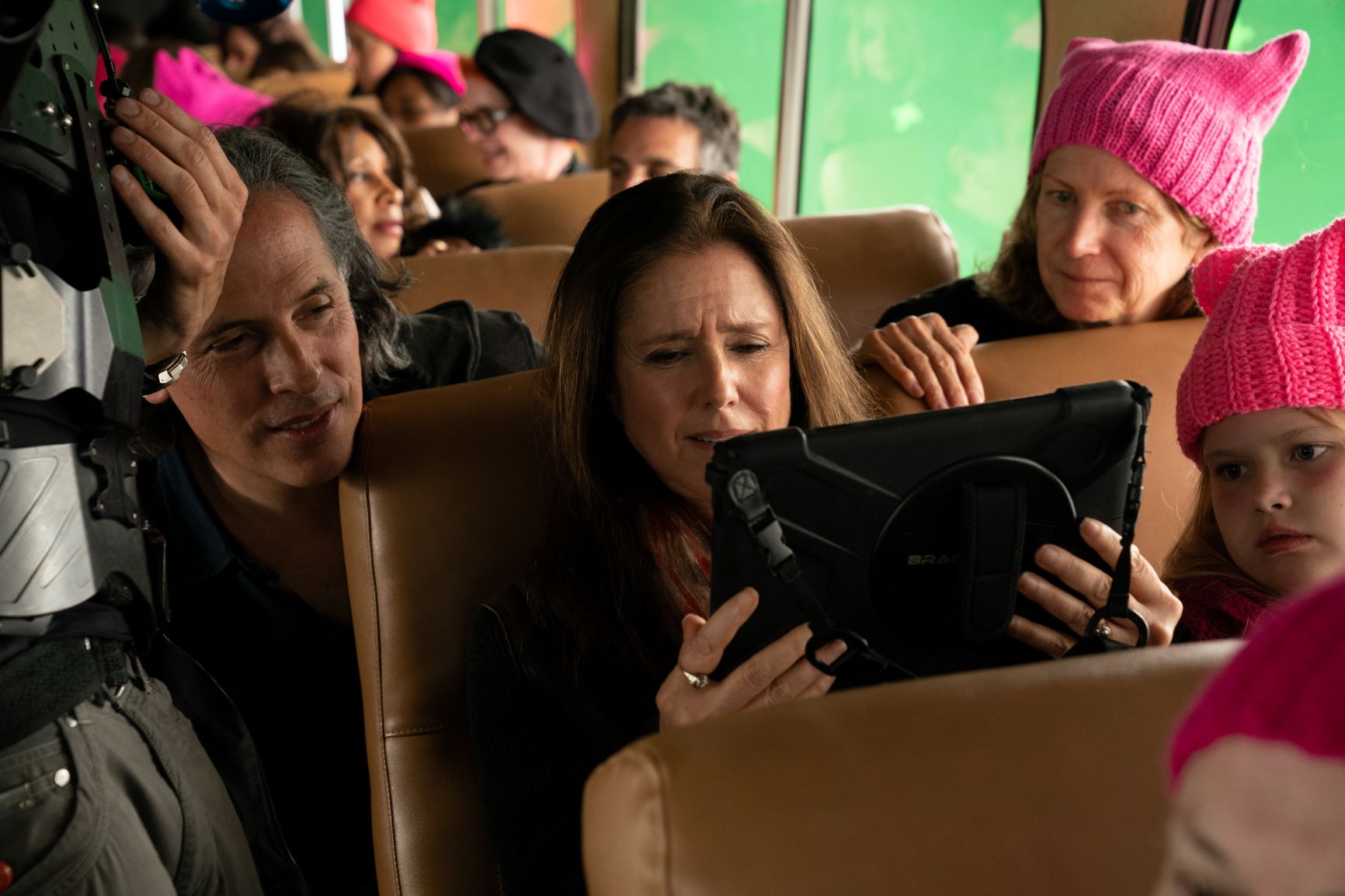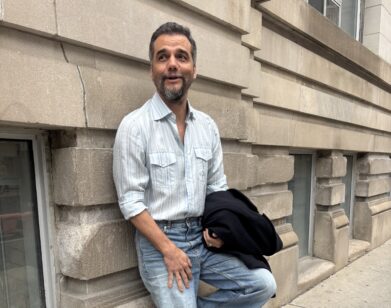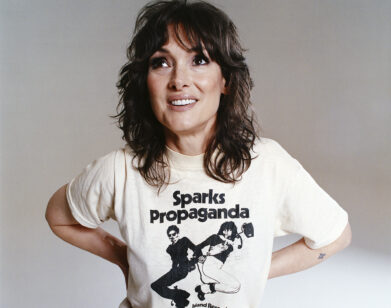Director
Julie Taymor and Helen Mirren on Why The Glorias Is a Movie for This Moment

Five years ago, when she began her quest to commit Gloria Steinem’s life to the screen, Julie Taymor could have followed the dog-eared playbook of a Hollywood biopic: cast a star in the role of the pioneering feminist, follow her through her early days as an intrepid undercover reporter exposing sexism at The Playboy Club and as a founding editor of Ms. magazine, and then, as she assumes her role as a nationally recognized activist in her later years, signal the passing of time with some well-placed prosthetics and gray hair dye. But that wouldn’t be a Julie Taymor film. As the director of big-screen spectacles such as Titus, Frida, and Across the Universe, not to mention her Broadway production of The Lion King, the 67-year-old visionary has proved herself to be one of cinema’s foremost expressionists, willing to take fantastical leaps and dream-like detours from reality in order to express some kind of inner life. Her new film about Steinem’s life, The Glorias, is filled with such flourishes, and features four separate actors—Ryan Kiera Armstrong, Julianne Moore, Alicia Vikander, and Lulu Wilson—playing Steinem at various points in her life. From her home in Martha’s Vineyard, Taymor connected with her friend, Oscar winner Dame Helen Mirren, who starred in Taymor’s adaptation of Shakespeare’s The Tempest, to discuss, among other things, why the time for The Glorias is right now.
———
HELEN MIRREN: First of all, how are you?
JULIE TAYMOR: I’m happy, because I’ve been able to be in nature for most of these COVID days. It makes all the difference that I’m not surrounded by the city, and I feel very, very lucky to be able to do that.
MIRREN: It was a great inspiration for me to watch your movie. It was very moving. It got to me, at the end. I was crying, because of this situation that we find ourselves in politically and because that whole trajectory is very much the trajectory of my life. Was it her book that drew you to the idea of making this film?
TAYMOR: Yes, I read My Life on the Road, which is not a normal autobiography, because it doesn’t begin at the beginning and move along. But I didn’t read it with the intention of making a film. I read it on the beach to enjoy it. Gloria knew my mother [the educator Betty Taymor], who is 99 now. I dedicated the film to her, because she wrote a book called Running Against the Wind, which Gloria had read. She knew my mom’s work in the Democratic Party, as a delegate, and as someone who started all these programs to get women into politics. So this is in my background, and I was so touched by the book, particularly the parts where she is younger. To see her mother go through what she went through will let us all understand why Gloria, in some ways, never really had a family, because she already took care of her mother. She was, at 12, the mother of her mother. Her father, who she adored, was a terrible, irresponsible man.
MIRREN: Played beautifully by Timothy Hutton. I thought that was a brilliant piece of casting. He got the charm and the sweetness and the terrible irresponsibility all in one go. You could absolutely see why she would adore him.
TAYMOR: Gloria says that because she loved her father so much, she feels that she always had good relationships with the myriad of lovers she had. I think about you when she describes her relationships as little marriages, because she was in an age when you just didn’t sleep around, you actually got involved emotionally.
MIRREN: Yes, until I met Taylor [Hackford, Mirren’s partner], I was serially monogamous.
TAYMOR: Me, too, until Elliot [Goldenthal, Taymor’s partner].
MIRREN: You said this is the first time you’ve made a straightforwardly political film, and, to a certain extent, it is. But watching it, it was very much a Julie Taymor film. As you did with Across the Universe, you elevated it into a poetic world. I’m thinking of the interview sequence.
TAYMOR: The one that everybody argues over. You either hate it, or you love it.
MIRREN: There’s a famous interview of me on the internet, experiencing more or less exactly the same thing. I just thought it elevates the film into poetry, that these moments are not just the literal thing of what happened and who said what and how. But it’s the feeling that you have inside of you. When I came off the stage from that interview, I was trembling inside. I was profoundly insulted, because I had not been considered as an artist, or as a serious person. It was purely about my physicality. That was the only thing that counted about me. It was so degrading. And so for me, that expression that you’ve given it gives it passion and anger and a maelstrom of emotion.
TAYMOR: I will admit that it’s not in her book. People can interpret it in different ways. Many young people love it, maybe because it breaks out of the mode of naturalism. Some older women find it a little scary, because they see it as anti-male. It’s the opposite. It’s whimsical.
MIRREN: I have to say, Julianne Moore was wonderful. I have a Julianne Moore rule in my professional life, which is, when I’m offered a film, I always ask myself, “Would Julianne Moore do it?” Because if she would, I feel I should do it.
TAYMOR: Oh my god, I could’ve had a fifth Gloria in you!
MIRREN: I have met Gloria Steinem myself. I was very, very excited to meet her. You’re absolutely right. There’s this kindness and sweetness about her, but you know that inside, there is a core of absolute strength and steel and commitment. I thought Julianne Moore got that beautifully.
TAYMOR: What Julianne really nailed was she kept adding “Right, right?” to the end of sentences. Gloria doesn’t always do that, but it helps you understand that she wants consensus. She’s not about thrusting her ideas onto someone else. She’s not that kind of leader. She’s very similar to Ruth Bader Ginsburg in that way, with a quiet fierceness, a power that is not aggressive and does not offend. As much as the other side wants to make her a baby killer, that is the opposite of who Gloria Steinem is.
MIRREN: I grew up in England, and I was aware of the whole feminist movement. From the moment I was 13 or 14, I knew how monstrously stacked the world was against women. But I never joined the feminist movement, and I say this as a criticism of myself. I thought what you did was you walked the walk, rather than talking the talk, if you know what I mean.
TAYMOR: Yes, I feel the same way.
MIRREN: But I was living a completely feminist life. I earned my money, I didn’t get—not that a feminist can’t get married, of course they can—but independence was the most important thing for me. But I criticize myself for not understanding that what Bella Abzug and Betty Friedan and Gloria were doing was so important. You have to shout. What is your feminist background?
TAYMOR: I’m like you and Gloria. I’m 20 years younger than Gloria, but I went to Asia when I was 20. I had a fellowship after Oberlin and I went to Indonesia for three months and stayed four years. You went to Africa with Peter Brook, and I had the same experience on the trains in Indonesia, third class in the women’s cars. I got the same questions: “Are you married? Do you have children?” Even the abortion part of Gloria’s story happened to me in Bali. It was hard and horrible. I think, like you, I was walking the walk. I didn’t read Ms. at the time. The point is, Gloria was a terrible speaker. She didn’t hatch an activist. She wasn’t, “Me, me, me, I always knew I should be President of the United States.” That’s not who she is. In her travels, where she went out of her comfort zone, she was just always receptive, especially to women of other cultures and races.
MIRREN: I’ve spent my whole life on film sets where it was 95 percent men, if not more. I’ve tried to make men understand what it would be like if every day of their life, they were surrounded by 95 percent women in their work situation, that it’s very weird. They went, “Oh yeah, I suppose.” They kind of hadn’t seen it. It’s very weird. The other day I did a little comedy with Sarah Cooper, and I walked on the set and it was at least 50 percent female. Wherever she could get women in, there were women in.
TAYMOR: This is important. Even with this film, people think, “Oh, it’s for young women.” The men I know who have seen it have been more emotionally moved than women, and I’ll tell you precisely why. We have millions of buddy films, with men. We don’t have buddy films with women. Women’s movies almost always revolve around the boyfriend, the husband, the great leader, the supportive wife, and everything is geared toward a competition, the cat-fight, toward a male. Gloria had a lot of boyfriends, but this is a love story amongst women, and it’s not a sexual one. It’s one where women are out there fighting in the streets, but not with guns and weapons, like all the female empowerment movies we see now. If I have to look at another movie where women are kicking butt in their underwear, I swear. Power is about listening and paying attention and getting things done. I’m thinking of women like Angela Merkel and Jacinda Ardern.
MIRREN: I thought it was so interesting that the countries that did best with COVID-19 were led by women, because women got things done and they were realizing there was something very ill with the body of their people, that they just went in there and said, “We’ve got to deal with this, now. You don’t have that candy before you go to bed. You go to bed now.” I thought it was fascinating that they were the ones who were prepared to grasp the nettle, and the men didn’t want to. They wanted to pretend everything was okay.
TAYMOR: Men were narcissistic about it. They thought it reflected on them, that they had failed. Whereas women don’t take it that way. They’re just saying, “My baby’s sick, what do I do? Let me get the scientists and have them tell my babies what they need.” There was no ego involved.
MIRREN: When did you begin your journey with this film?
TAYMOR: This January, it’ll be five years. We thought we’d be celebrating this film with the first female president. In November, four years ago, we didn’t have the money yet. We had a producer involved and we had enough money to do documentary footage. We actually shot the last election at Samantha Powers’s apartment. We’re at the Waldorf Astoria with Gloria, Madeleine Albright, and 40 female ambassadors from around the world, thrilled and excited.
And as the night went on and the realization of what was happening happened, all the women started to leave, they started to realize that everything that Hilary had done for their countries—because they knew that with her as president, there would be resources for women’s groups and young girls and education—they saw all of that disappear, right there on television. The last people in the room were Samantha Powers, Gloria Steinem, me, and my producer. Once we knew that it was over, Gloria said, “I’m a foul-weathered friend. I’m off to the Javits Center.” She looked at us and she said, “Now we have to look for the upside of the downside.” She never gives up. I’ve been with her on these press things all week, and last week, when Ruth Bader Ginsburg died, she was asked, “How do you keep going?” She said, “Are you kidding? You have to! If you don’t keep going and believing that you can make change, then you’ll be responsible for what you get.” She’s a hope-aholic, and she knows that.
MIRREN: Ironically, because of what’s happened politically in the last four years, and may well continue, your film has become exponentially more important. It’s not just a look at history and how we got here, but it’s a look at how seriously people fought to get to where we are and how terribly, terribly precarious that is.
TAYMOR: Totally. Roe v. Wade is on the chopping block. Healthcare for all is in danger. The ERA is still not ratified. “Make America Hate Again” is the motto of Trump. It’s really astounding. But this film is an education. African-American women were at the forefront of the feminist movement. We always thought it was white women. It’s just not true. I wanted to show Wilma Mankiller, the first female chief of the Cherokee nation, who was given the Medal of Freedom by Obama. Gloria often said, “In another time, she would’ve been the first female president of the United States.”
MIRREN: Absolutely. It’s a massively important film and at the end, to see those marches, was very moving. That’s when I started crying, because the import of that against what we’re looking at now was very, very emotional.
TAYMOR: We thought we were going in one direction and we are on a precipice. So we can either fly up, or go down. We made a choice to come out streaming, because we knew we could reach more people, and there are no movie theaters now. We didn’t want to wait.
MIRREN: It’s an important film for young women, I do believe. Gloria is now the age of their grandmothers. A teenager would probably not know Gloria’s name or the trajectory that brought them to this place. Have you had reactions from young women?
TAYMOR: I had a 10-year-old here on Martha’s Vineyard see it at a drive-in and she went berserk. I am absolutely infuriated that the MPAA gave us an R rating. I’m not going to be too attacking about this, but it feels like it’s a right-wing conspiracy on the movie, because there’s no nudity, no sex, and Flo Kennedy says the F word three times. As if it’s going to really hurt young people to hear the word “fuck.” The only other thing I heard was there is a drawing from Screw magazine that’s shown for one second. You know what? 10-year-olds should see that drawing and know what their bodies and their mommy’s bodies look like. I mean, this is education. It’s not keeping kids away from the way life is. That is dangerous. We refused to cut out the things that got us an R rating, so all I can say is ignore it. See it with your grandchildren, your children, your nieces and nephews. See it with everyone.






